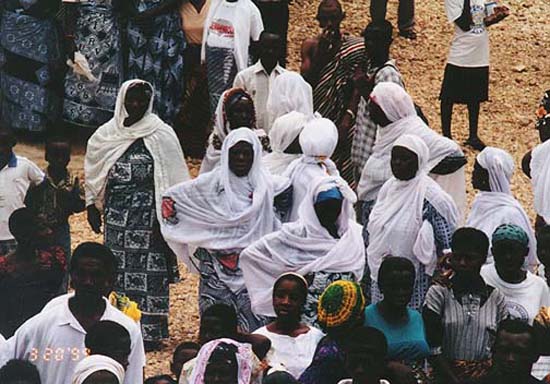
After three years in Ghana, Africa, Stacy Kreger already can see a change in herself
After three years in Ghana, Africa, Stacy Kreger already can see a change in herself.
"Iíve learned just how good we do really have it in the U.S., and to never take that for granted. And to be very tolerant of other cultures, of other religions, of other people, because you canít say youíre right and youíre wrong. Thereís a place for everybody on the planet. Itís good to be accepting of everyone. And everyone has something to teach you, even the small children."
The Indianapolis woman served her first term in Tsito and then reapplied for another two years to concentrate on issues of HIV/AIDS. In her new post in Ho, Kreger lives in an apartment by herself and works through the water sanitation health sector. Her days also include dropping by a trade school set up for prostitutes, school dropouts and needy teen mothers who learn sewing, hairdressing and kente cloth weaving.
During the first half of Kregerís stay, she taught chemistry, integrated science and some math to students in open-air classrooms in a concrete school with no electricity or running water. On average, she taught two or three 50-minute classes a day. HIV/AIDS education was of the utmost importance in Ghana, given that 340,000 people are living with HIV/AIDS in a country smaller than Oregon, but Kreger says Ghanaians arenít interested in hearing about it.
"We have a lot of speakers come to the school to speak about HIV/AIDS. The students just turn their heads. You can just see it. ĎOh god, not again.í They donít think itís real because thereís a huge stigma. If someone finds out that they do have HIV, theyíre pretty much sacked, like kicked out of the house, kicked out of the village," Kreger says.
"The disease is considered immoral. Only immoral people get this sickness. No one good and healthy gets it. So itís really hard for people to get tested. And there are like three support groups in the whole country."
Kreger seems to have embraced the culture wholeheartedly, and being home for the first time after three years in Ghana gave her a nasty cold and a serious case of culture shock.
"I feel like Iím very out of it still. Iím hoping Iíll snap out of it. I feel like Iím in la-la land. All I want to do is sleep and watch TV. I think I needed to get away from Ghana for a while, but I think by the end of my visit Iíll be recharged," says Kreger, who also had trouble going to the grocery store here. Choosing between more than one cereal was too much. She even craves the staple "fufu," a starchy food made from a plantain or cassava by peeling, boiling and "pounding the heck out of it." You donít chew the doughy fufu; you just swallow it.
Kreger sees the most substantial difference between Ghana and America in the level of contentedness there, a recurring theme in speaking with Peace Corps volunteers.
"You can see really poor children with absolutely nothing, no water, no electricity, just happy as can be. And then you see Americans with absolutely every little necessity they could possibly want and still be miserable and wanting to commit suicide. Itís just opposite ends of the spectrum."
Despite Kregerís thoughts on American discontent, stereotypes in Ghana are quite different.
"People absolutely love America in Ghana," Kreger says. "They put it way up on a pedestal. Itís kind of frustrating because America doesnít need to be up on a pedestal. Every country has its mistakes.
"A lot of the more educated people that have been out of the country have different perceptions of America; theyíre not too high," Kreger says. The 25-year-old has a friend who works with an educated teacher who makes no bones about his dislike of America. "The man didnít like how all the clothes that are sent to Ghana are second-hand goods, when Americans buy new clothes for friends and family."
